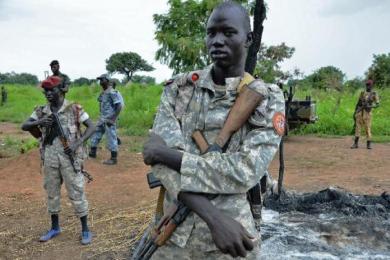South Sudan denies fresh attacks on SPLM-IO forces in Mundri
April 5, 2016 (JUBA) – South Sudanese government has on Tuesday denied reports that its forces in Mundri county of Western Equatoria region have launched attacks on positions held by forces belonging to armed opposition faction of the Sudan People’s Liberation Army (SPLM-IO).

The accusation that government forces have launched offensive against the opposition forces in Mundri area, west of Juba, has sparked tension and concerns that it could undermine the implementation of the peace deal despite the ongoing deployment of armed opposition forces in the national capita as part of the security arrangements.
Aggrey Idri, a leading member of the advance team of the armed opposition faction said government troops attacked their forces in their jungle base in Mundri area, forcing them to take defensive positions without engaging in a hot pursuit at the time of attack.
The opposition figure, according to the post on his Facebook page, did not say when the attack took place.
“Government forces are at it again in carrying out massively ground attack on our positions in Lanyi, Lozo areas of East Mundri County. These attacks which are in clear violations of the ceasefire as per ARCISS (Agreement on the resolution of the conflict in the republic of South Sudan) are intended to disrupt any attempt of cantonment in greater Mundri,” said Idri.
However, South Sudan’s defence and interior officials told Sudan Tribune on Tuesday they had no fresh information on government operations in Mundri area, one of the opposition strongholds during the conflict in Equatoria.
Senior government officials, including information minister, Michael Makuei Lueth, have been quick to downplay and consider military activities in the area as “act of banditry” and not necessarily those related to armed dissidents allied to armed opposition leader, Riek Machar.
The government has also refused to allow the opposition forces in Equatoria and Bahr el Ghazal regions to designate cantonment areas, arguing that they were not part of the 21 months of the civil war and only popped up after the peace agreement was signed.
SPLM-IO on the other hand said they have forces in the two regions and should be cantoned, calling on the government to stop attacking them in order for the peace agreement to hold.
Local officials and activists confirmed that there were clashes over the weekend in the Mundri area around the opposition base between government forces and opposition fighters.
The fighting, according to eye witnesses, broke out after members of the government forces ambushed troops on their way out in the area last Thursday. At least two government soldiers have reportedly died and several others sustained injuries.
The spokesperson of the government forces, Brigadier General Lul Ruai Koang said he was not aware of the attack. He affirmed commitment of the government forces to comply with the directives they have received to implement the peace agreement.
Opposition fighters, or those sympathetic to its cause in the area, and forces allied to President Salva Kiir and his political allies in the area have fought against each other during the period of the brutal conflict, which ended with the signing of a faltering peace in August 2015.
An unknown number of forces allied to Machar have remained in the area seeking to go to the cantonment areas since the peace deal was signed, pending efforts and arrangements to reunify them with the government’s army or police force.
Machar and his supporters from the region say they need their own personal bodyguards, who must come from those who fought for their cause.
National elections are due after the end of a transitional period of two and a half years following the formation of the transitional government of national unity hoped to prepare a levelled ground for political activities and competition in the 2018 elections as stipulated in the deal.
(ST)
